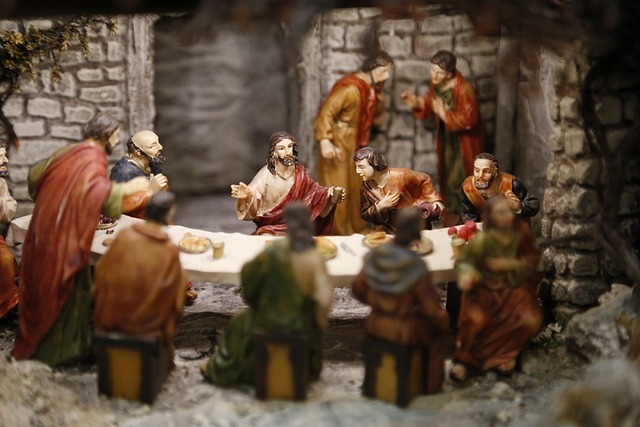An apostle in the Catholic Church refers to one of the twelve chosen by Jesus to be his closest followers and to spread his teachings.
Table of Contents
Role of the Apostle in the Catholic Church
Have you ever wondered what exactly an Apostle is in the Catholic Church? Apostles play a crucial role in the Church, but their significance may not always be clear to everyone. In this article, we will explore the role of the Apostle in the Catholic Church and why they are so important.
First and foremost, it is essential to understand that the term “Apostle” comes from the Greek word “apostolos,” which means “one who is sent out.” In the context of the Catholic Church, an Apostle is someone who is chosen and sent out by Jesus to spread the Gospel and build up the Church. The Apostles were the original twelve disciples chosen by Jesus during his earthly ministry, including Peter, James, John, and others.
The Apostles played a crucial role in the early Church, as they were the ones who received the teachings of Jesus firsthand and were commissioned to go out and share them with others. They were the foundation of the Church, and their authority was seen as coming directly from Jesus himself. In the Catholic tradition, the Pope, who is considered the successor of Peter, holds a special place of authority as the Bishop of Rome and the head of the universal Church.
The role of the Apostle in the Catholic Church is not limited to the original twelve disciples. In a broader sense, all bishops are considered successors of the Apostles and share in their mission to teach, sanctify, and govern the Church. Bishops are seen as the spiritual descendants of the Apostles and are entrusted with the task of preserving and passing on the teachings of Jesus to future generations.
In addition to bishops, priests also play a vital role in continuing the work of the Apostles. Priests are ordained to preach the Gospel, celebrate the sacraments, and shepherd the faithful in their spiritual journey. While they do not have the same authority as bishops, priests are called to collaborate with them in building up the Church and spreading the message of Jesus Christ.
The role of the Apostle in the Catholic Church is not just about preaching and teaching; it also involves serving the needs of the community and caring for the marginalized and vulnerable. Just as Jesus reached out to the poor and the outcasts of society, so too are Apostles called to show compassion and mercy to those in need. This aspect of their ministry is reflected in the Church’s social teachings, which emphasize the importance of justice, solidarity, and care for the common good.
In conclusion, the role of the Apostle in the Catholic Church is multifaceted and essential to the life of the Church. Apostles are called to be witnesses of the Gospel, teachers of the faith, and shepherds of the flock. They are entrusted with the task of preserving and passing on the teachings of Jesus to future generations and caring for the spiritual and material needs of the community. As members of the Church, we are all called to be Apostles in our own way, sharing the message of Jesus Christ with others and living out his teachings in our daily lives.
Importance of Apostles in Catholic Church History
Have you ever wondered about the role of apostles in the Catholic Church? Apostles play a crucial role in the history and foundation of the Catholic Church. They were chosen by Jesus himself to spread his teachings and establish the Church. In this article, we will explore the importance of apostles in the Catholic Church history.
The word “apostle” comes from the Greek word “apostolos,” which means “one who is sent out.” In the context of the Catholic Church, apostles are considered to be the original twelve disciples chosen by Jesus to be his closest followers. These apostles were entrusted with the mission of spreading the Gospel and establishing the Church.
The apostles played a key role in the early Christian community. They were witnesses to the life, death, and resurrection of Jesus Christ. They were the ones who received the Holy Spirit at Pentecost and were empowered to preach the Good News to all nations. The apostles traveled far and wide, spreading the message of Jesus and establishing Christian communities.
One of the most important apostles in the Catholic Church history is St. Peter. He was chosen by Jesus to be the leader of the apostles and the foundation of the Church. In the Gospel of Matthew, Jesus tells Peter, “You are Peter, and on this rock I will build my Church.” This passage is often interpreted as Jesus appointing Peter as the first pope and the leader of the Church.
St. Paul is another important apostle in the Catholic Church history. Although he was not one of the original twelve disciples, St. Paul was chosen by Jesus to be an apostle to the Gentiles. He traveled extensively, preaching the Gospel and establishing Christian communities in various parts of the Roman Empire. St. Paul’s letters, which are included in the New Testament, are a valuable source of Christian theology and ethics.
The apostles were not only responsible for spreading the Gospel but also for establishing the structure of the Church. They appointed bishops, priests, and deacons to lead and serve the Christian community. The apostles also played a key role in the development of Christian doctrine and theology. They convened councils to address theological controversies and establish the core beliefs of the Church.
The importance of apostles in the Catholic Church history cannot be overstated. They were the foundation upon which the Church was built. Their witness to the life, death, and resurrection of Jesus Christ continues to inspire and guide the faithful today. The apostles’ teachings and example serve as a source of strength and encouragement for all Christians.
In conclusion, apostles play a crucial role in the history and foundation of the Catholic Church. They were chosen by Jesus to spread his teachings and establish the Church. The apostles were witnesses to the life, death, and resurrection of Jesus Christ and were empowered by the Holy Spirit to preach the Gospel to all nations. Their leadership and example continue to inspire and guide the faithful today.
Apostolic Succession in the Catholic Church

Have you ever wondered what the term “Apostle” means in the Catholic Church? Well, you’re not alone! The concept of apostleship is a fundamental aspect of the Catholic faith, rooted in the teachings of Jesus Christ and passed down through the centuries. In this article, we will explore the significance of apostleship in the Catholic Church and how it relates to the concept of apostolic succession.
The term “Apostle” comes from the Greek word “apostolos,” which means “one who is sent.” In the context of the Catholic Church, an Apostle is someone who is chosen by Jesus Christ to be his representative and to spread his teachings to the world. The original twelve Apostles were handpicked by Jesus during his ministry on earth, and they played a crucial role in establishing the early Christian Church.
One of the key aspects of apostleship in the Catholic Church is the concept of apostolic succession. This refers to the belief that the authority and teachings of the Apostles have been passed down through the generations of bishops in an unbroken line of succession. This means that the bishops of the Catholic Church today can trace their authority back to the original Apostles, ensuring that the teachings of Jesus Christ remain pure and unchanged.
The idea of apostolic succession is central to the Catholic Church’s understanding of its own authority and legitimacy. By maintaining a direct connection to the Apostles, the Church believes that it is preserving the true teachings of Jesus Christ and safeguarding the faith from corruption or distortion. This continuity of authority is seen as essential for maintaining the unity and integrity of the Church.
In addition to preserving the teachings of Jesus Christ, apostolic succession also plays a practical role in the governance of the Catholic Church. Bishops, who are considered the successors of the Apostles, are responsible for overseeing the spiritual welfare of their dioceses and ensuring that the faithful are properly instructed in the teachings of the Church. Through their authority, bishops are able to guide and shepherd the members of their flock, providing pastoral care and leadership in accordance with the teachings of Jesus Christ.
The concept of apostolic succession is not unique to the Catholic Church; other Christian denominations, such as the Eastern Orthodox Church and some Anglican churches, also maintain a belief in the continuity of authority from the Apostles. However, the Catholic Church places a particular emphasis on the role of the Pope, who is considered the successor of St. Peter, the chief of the Apostles. The Pope is seen as the visible head of the Church and the ultimate authority on matters of faith and morals.
In conclusion, the term “Apostle” in the Catholic Church refers to someone who is chosen by Jesus Christ to spread his teachings to the world. Apostleship is a foundational aspect of the Catholic faith, rooted in the teachings of Jesus and passed down through the generations in the concept of apostolic succession. By maintaining a direct connection to the Apostles, the Catholic Church believes that it is preserving the true teachings of Jesus Christ and ensuring the unity and integrity of the faith.
The Twelve Apostles and their significance
Have you ever heard the term “Apostle” in the Catholic Church and wondered what it means? Well, you’re not alone! The term “Apostle” refers to the twelve chosen disciples of Jesus Christ who were sent out to spread the teachings of Christianity. These twelve men played a crucial role in the early days of the Church and are considered to be the foundation of the Christian faith.
The Twelve Apostles were handpicked by Jesus himself during his ministry on Earth. They were chosen to be his closest companions and were given the task of carrying on his mission after his death and resurrection. Each Apostle had a unique role to play in spreading the message of Jesus, and their contributions were instrumental in the growth of the early Christian community.
One of the most well-known Apostles is Peter, who is often referred to as the “rock” on which the Church was built. Peter was a fisherman by trade and was known for his impulsive nature. Despite his flaws, Jesus saw great potential in Peter and chose him to be the leader of the Apostles. Peter played a key role in the early Church, preaching the gospel and performing miracles in Jesus’ name.
Another prominent Apostle was Paul, who was originally a persecutor of Christians before he had a dramatic conversion experience on the road to Damascus. Paul went on to become one of the most influential figures in early Christianity, writing numerous letters to the early Christian communities and traveling extensively to spread the message of Jesus. His writings are now a central part of the New Testament and continue to inspire Christians around the world.
The other Apostles also made significant contributions to the early Church. James, the brother of John, was the first Apostle to be martyred for his faith. John, known as the “beloved disciple,” played a key role in spreading the gospel and wrote the Gospel of John, as well as several letters and the Book of Revelation. Thomas, often referred to as “Doubting Thomas,” famously doubted the resurrection of Jesus until he saw him with his own eyes. After this encounter, Thomas became a fervent believer and traveled to India to spread the gospel.
Each Apostle had a unique personality and background, but they all shared a common mission: to spread the message of Jesus Christ to the ends of the earth. Their dedication and sacrifice laid the foundation for the Christian faith and continue to inspire believers today.
In conclusion, the Twelve Apostles were a diverse group of men who played a crucial role in the early days of the Christian Church. Their teachings and example continue to guide and inspire Christians around the world. As we reflect on their lives and contributions, we are reminded of the power of faith and the importance of spreading the message of Jesus to all people. The Apostles may have lived two thousand years ago, but their legacy lives on in the hearts of believers today.
The teachings and mission of the Apostles in the Catholic Church
Have you ever wondered what the term “Apostle” means in the Catholic Church? The word “Apostle” comes from the Greek word “apostolos,” which means “one who is sent out.” In the Catholic Church, the Apostles were the twelve men chosen by Jesus to be his closest followers and to spread his teachings to the world. These Apostles played a crucial role in the early Christian Church and their teachings and mission continue to be central to the Catholic faith today.
The Apostles were chosen by Jesus himself to be his closest companions and to carry on his mission after his death and resurrection. They were witnesses to Jesus’ teachings, miracles, and ultimately his death and resurrection. After Jesus ascended into heaven, the Apostles were filled with the Holy Spirit on Pentecost and began to spread the message of Jesus to all nations.
Each of the Apostles had a unique role in spreading the Gospel and building up the early Christian Church. For example, Peter, also known as Simon, was chosen by Jesus to be the leader of the Apostles and the rock upon which he would build his Church. Peter played a central role in the early Church, preaching the Gospel and performing miracles in Jesus’ name.
Another prominent Apostle was Paul, who was not one of the original twelve, but was chosen by Jesus after his resurrection to be an Apostle to the Gentiles. Paul traveled extensively throughout the Roman Empire, preaching the Gospel and establishing Christian communities. His letters, which make up a significant portion of the New Testament, continue to be a source of inspiration and guidance for Christians today.
The teachings of the Apostles are central to the Catholic faith and are preserved in the teachings of the Church. The Apostles’ Creed, which is recited by Catholics around the world, summarizes the core beliefs of the Catholic Church and is based on the teachings of the Apostles. The Apostles also established the sacraments, which are sacred rituals that convey God’s grace to believers. These sacraments, such as Baptism and the Eucharist, are essential to the life of the Church and are celebrated by Catholics throughout their lives.
The mission of the Apostles continues to be carried out by the successors of the Apostles, the bishops, who are responsible for shepherding the faithful and teaching the Gospel. The Pope, who is the Bishop of Rome and the successor of Peter, is considered the spiritual leader of the Catholic Church and is responsible for upholding the teachings of the Apostles and guiding the Church in matters of faith and morals.
In conclusion, the Apostles played a crucial role in the early Christian Church and their teachings and mission continue to be central to the Catholic faith today. Through their witness and preaching, the Apostles spread the message of Jesus to all nations and established the foundation of the Church. Their teachings are preserved in the teachings of the Church and continue to inspire and guide believers today. As we reflect on the role of the Apostles in the Catholic Church, we are reminded of the importance of spreading the Gospel and living out our faith in our daily lives.
Conclusion
In the Catholic Church, an apostle is a disciple chosen by Jesus to spread his teachings and establish the Christian Church. Apostles are considered to be the foundation of the Church and hold a special role in the hierarchy of the Church.


